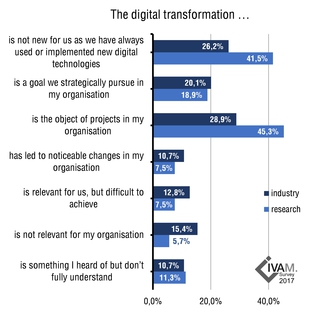The advancing digitalization is expected to lead to major changes in industry, economy and society in the years to come and is perceived as a great challenge. The innovative microtechnology industry, which has always played a key role in technological advances, does not think of the digital transformation as a disruption.
According to the data survey of the IVAM Microtechnology Network, the microtechnology industry approaches digitalization in specific projects and by means of product and process innovation. Two-thirds of the European companies and eighty percent of research institutions are addressing digitalization issues in one way or another.
But almost a third of the industry representatives do not regard the digital transformation as a new development as they have used or implemented new digital technologies in the past already.

In particular, the digital transformation has a significant impact on R&D activities in the field of microtechnology: 37.7 percent of the European research institutions are developing new products or technologies that assist the digital transformation. In the microtechnology industry, the digital transformation has so far inspired a little less than a fifth of companies to develop new products or technologies. A slightly higher proportion of enterprises (23.5 percent) enhance their established products – for example with interfaces or apps – to make them fit for digital applications. Another fifth of companies did not have to change their existing products or technologies to enable them to be used in digital applications.
Although an average of one fifth of the microtechnology companies digitalize production processes and organizational processes, only a few of them ascribe this to some new trend. In only ten percent of companies digital transformation has led to noticeable changes. Apparently, digitalization is not perceived as a disruption in this area, either.
“Despite their pioneering role in the development and implementation of state-of-the-art technologies, the microtechnology companies should think of addressing digitalization issues more strategically if they want to keep providing marketable products and technologies in the long term”, explains Thomas Dietrich, CEO of IVAM. "Companies often underestimate the extent to which supply relationships and the expectations of customers will change in the course of digitalization.”
At present, just under a fifth of the companies are giving the topic enough priority to tackle it strategically. Only a few companies have adjusted their business models in the course of digitalization and are offering new services. One third of the organizations do not have enough manpower to strategically implement digitalization; or personnel capacities are needed for other tasks that are treated with a higher priority.
The information has been collected by the IVAM Microtechnology Network in its annual economic data survey among microtechnology companies and research institutions throughout Europe.

